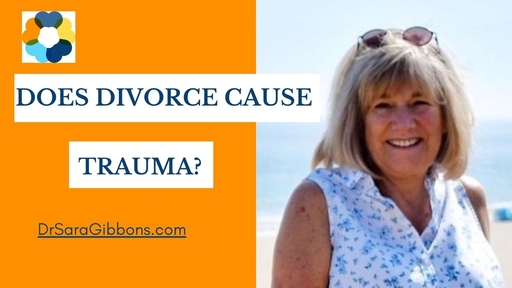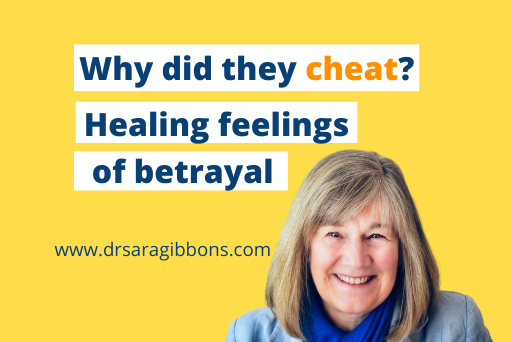Does divorce cause trauma? with Sara Gibbons
Divorce is tough, it’s an emotional rollercoaster, and it turns your life upside down. But can divorce cause trauma?
It’s not an outsiders view of the size of the event that is significant, but how it feels to the person experiencing the situation. This can also depend on each person’s beliefs about themselves and confidence in their place in the world. When you have a strong emotional response to an event, then trauma can be the result.
Feelings of powerlessness, being out of control, or fear for the future, including panic and anxiety, can be highly traumatic. When there is a shock involved, then trauma can result.
How your situation feels to you is important
Whilst trauma itself is simply a label, more important is how your situation feels to you and what you are experiencing. For example, you might be finding your situation is overwhelming. You might have had a bolt out of the blue about your partner or be feeling you can’t come to terms with the way someone you had a loving relationship with is now behaving towards you. Divorce can rock the core of your world that you had seen as your foundation, and when that happens it is traumatic.
When there is a shock involved, then trauma can result.
When a relationship breakup occurs everything is affected one way or another. Facing something so wholly life-changing and unknown can naturally give rise to fear for the future, emotionally, psychologically and financially. This can be especially true for those who don’t want the breakup or those who have suddenly discovered infidelity or some form of unexpected and unacceptable behaviour. There can be feelings of being out of control of life and powerless as expectations, hopes, and dreams disappear. It’s a difficult situation to handle well. It’s all new territory, and it’s challenging.
Go through painful feelings, not around them
These painful feelings need to be recognised for what they are and acknowledged. However, they are not unique. You may feel like the only person going through what you are experiencing, but that is not the case. Others have gone before you and come out stronger. This means there are people who genuinely understand what is happening for you. They can help you come out the other side much faster and less painfully than struggling by yourself.
The shock of the need for a divorce, potentially alongside behaviour changes from a previously loving partner, can cause a lot of confusion, self-doubt and self-blame. These are feelings that cannot and should not be buried.
What’s important is to recognise that these negative feelings are happening and not to suppress them. So often we try to avoid or minimise them because they hurt! But when we bury them, we push them inside. Then they cause our mind to either switch off and go into denial (with an underlying dose of anxiety bubbling under the surface) or become busy, increasing panic. If instead you can stay with those feelings, you’ll find that they will ease and then release, and you’ll subsequently feel lighter and more energised. If you are needing to forgive that doesn’t mean condoning unhealthy behaviour but it does set you free to move on.
What’s happening to you says nothing about your self-worth
By allowing yourself to feel them, totally accept that is how it is now, without trying to change anything, the feelings will pass and you will come out the other side. This process holds true for other emotions too, like grief and anger for example. You can’t go around these feelings, you have to go through them. In other words, we have to experience them to feel that lightness afterwards and reach the place where we can look back and say, well, that happened, that’s a fact, but I’m not emotionally attached to it anymore.
Know your own worth and move on from divorce trauma
It’s also true that trauma in divorce can get tangled with self-worth. It is essential to recognise that just because you are experiencing a painful breakup does not mean you are a bad person. It does not mean that you have little value or are not good enough.
Of course you’re good enough. What’s happening to you says nothing about your self-worth, and it need not say anything about your belief in yourself.
However, divorce can cause trauma in that it exposes our underlying fears and beliefs and that in itself can be tough to face. It can reveal why we want a relationship and why we fear not having one, for example. The good news is it can also be an opportunity to clear those patterns.
When you allow yourself to accept and fully feel painful feelings, then they pass. When you recognise that divorce says nothing about your self-worth, you will then be able to face the world again and make good decisions for your future.
So, does divorce cause trauma? Yes, divorce can be a traumatic experience because it exposes our soft underbelly. But it is also an opportunity to clear old patterns that are not serving, look afresh at your life, and move on and up.
Many people have been through this process before you, so you’re not alone in your experience, and you certainly don’t need to struggle on alone.
If you’d like more about handling divorce, then contact me here www.drsaragibbons.com/contact
Cheering you on in your new life
Sara x
More help for you:
Have a look at my free course www.drsaragibbons.com/divorcerecovery





